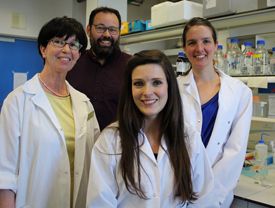A genetic defect
The new study revealed a genetic defect that causes juvenile arthritis in a young identical twin. Juvenile arthritis is the most common rheumatic disorder in children. Up to now, there was no clear cause for this. Scientists had been suspecting for a long time that various combinations of specific genetic and environmental factors make children susceptible to the disease.
Scientists examined the genetic code of each cell separately. "This enabled us to discover what went wrong in every cell type in the twins' blood. Thanks to the newest genetic techniques and immunological insights we could link the genetic defect to the disease's origin", according to dr. Stephanie Humblet-Baron (VIB-KU Leuven), one of the researchers involved in the study.
Mimic a human disease in mice
Experiments in mice confirmed the findings from the DNA test. Prof. Susan Schlenner (VIB-KU Leuven): "Thanks to new techniques it is relatively simple to quickly apply genetic modifications in the DNA of mice. This enables us to mimic the disease of individual patients in mice models. In this case it confirmed that the genetic defect effectively leads to a higher susceptibility to athritis."
From cause to treatment
According to immunologist prof. Adrian Liston (VIB-KU Leuven) these new insights are invaluable for the biomedical research. "Understanding the cause of the disease is the key to treating it." Liston's team works closely together with prof. dr. Carine Wouters, who, as a University Hospitals Leuven doctor, coordinated the clinical aspect of the research: "This study is an important milestone. The new mice model will be a tremendous help to examine the disease mechanism in more detail and to develop targeted therapies for this disorder."
